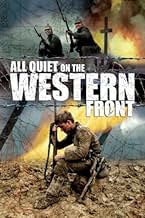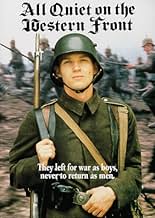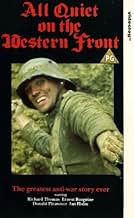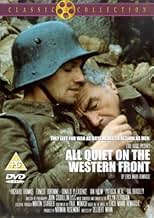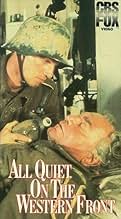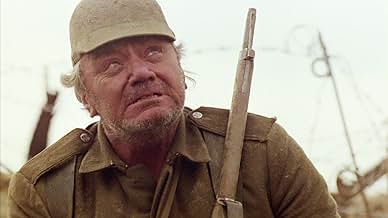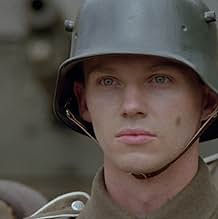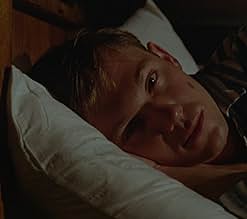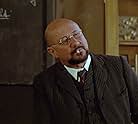PUNTUACIÓN EN IMDb
7,1/10
11 mil
TU PUNTUACIÓN
Un joven soldado se enfrenta a una profunda desilusión por el horror durante la Primera Guerra Mundial.Un joven soldado se enfrenta a una profunda desilusión por el horror durante la Primera Guerra Mundial.Un joven soldado se enfrenta a una profunda desilusión por el horror durante la Primera Guerra Mundial.
- Dirección
- Guión
- Reparto principal
- Ganó 1 premio Primetime Emmy
- 2 premios y 6 nominaciones en total
Paul Mark Elliott
- Josef Behm
- (as Mark Elliott)
David Bradley
- Albert Kropp
- (as Dai Bradley)
Matthew Evans
- Friedrich Muller
- (as Mathew Evans)
Marie-Noëlle Barre
- French Girl
- (as Marie Noelle-Barre)
Reseñas destacadas
Considering this was made in 1979, this is quiet an astonishing film, that is incredibly realistic in its portrayal of the futility of combat in world war one. I first saw this film on TV in the early 80's , and i've seen it again a few times on video since then. The story is compelling, powerful and incredibly moving. The most powerful message of the movie, in my opinion, is that there are no "good" or "bad" guys in war - there's just you and someone else who is out to kill you. The suffering that the real soldiers went through in WW1 is powerfully conveyed in this film. One of my all time favourites - considering that it was just a TV film makes its even more astonishing. If you want a film to move you and make you think about life, look out for this one in your video store. This is another classic "sleeper" - along with the likes of Glory, Shawshank Redemption, Cross of Iron and others that haven't hit the Hollywood bigtime, but have made a lot of people feel moved....
Many people make the mistake of thinking of this movie as a remake of the 1930 film classic. In reality, both movies are a visual telling of the 1929 novel by the same name; at different points in time. This 1979 film is just a retelling of that story, and it's obvious from its differences from the 1930 film. Personally I like this version better...it's not overacted, it was filmed on location, it has a musical score, and it has a feeling of reality to it that the 1930 film just doesn't seem to have. No matter how many times I've watched it, the end always leaves me feeling as if I had been a part of the story and its effects linger with my being. Thanks Richard Thomas and crew
This 1979 remake of Lewis Milestones 1930 classic anti war film tells the story of German youths who enlist in the Kaisers army to fight for the Fatherland in the great war. Based on the masterful novel by Erich Maria Remarque the youths who join at the encouragement of their schoolteacher with dreams of glory quickly learn the horror of war. Some parts of this version are better than the original and in others the 1930 version still stands out
Ian Holm's portrayal of Himmelstoss the sadistic drill instructor comes off somewhat better than in the original. In this version he is not the boys hometown postman so the viewer only sees him as the stern and cruel D.I.. His cowardice scene is also handled better. Veteran actor Ernest Borgnine as Kat the group leader is only a tad off as being as good as Louis Wolheims. Richard Thomas as Paul Baumer the central figure is about neck and neck with Lew Ayres original. Donald Pleasance is convincing as Kantorek the boys schoolteacher who tells them their plans for the future must be put on hold in favor of serving the Fatherland. Both this and the 1930 recently restored version should be watched back to back if possible.
Many films that are remade often times do not stand up to their original counterparts but this 1979 film does. Considering it was a made for TV film makes that quite an accomplishment. If you enjoyed Saving Private Ryan you'll enjoy this one as well.
Ian Holm's portrayal of Himmelstoss the sadistic drill instructor comes off somewhat better than in the original. In this version he is not the boys hometown postman so the viewer only sees him as the stern and cruel D.I.. His cowardice scene is also handled better. Veteran actor Ernest Borgnine as Kat the group leader is only a tad off as being as good as Louis Wolheims. Richard Thomas as Paul Baumer the central figure is about neck and neck with Lew Ayres original. Donald Pleasance is convincing as Kantorek the boys schoolteacher who tells them their plans for the future must be put on hold in favor of serving the Fatherland. Both this and the 1930 recently restored version should be watched back to back if possible.
Many films that are remade often times do not stand up to their original counterparts but this 1979 film does. Considering it was a made for TV film makes that quite an accomplishment. If you enjoyed Saving Private Ryan you'll enjoy this one as well.
This is a very good anti-war movie. It shows how the young and naive are being brain-washed to think that somehow it is their duty to kill and die. Big words like Fatherland, Kaiser, God, Patriotism. But it is always the young generation that does the dying, whilst the old men discuss strategy over a beer. War has lost whatever legitimacy it ever may have had when the leaders left the front line to lead from the back, safe in their headquarters miles away from the killing. Sending young boys to their death whilst claiming it is eventually for the Good is the ultimate cowardice. Some get their come-uppance, such as Cpl Himmelstoss, but most live their lives in the comfortable cocoon of their self-righteousness the school teacher, the father, the Kaiser himself.
But sometimes a young soldier sees through the scam, as when Paul kills a Frenchman by sheer instinct, only too late realising what he has been forced to do to someone who might have been his brother. But even then the cultural impregnation is too strong for him to follow his true human feelings and draw the only logical conclusion. And of course in the end he pays the price himself. Destroyed - for what?
That is the lesson that we all should take to heart, to this very day.
A very good film based on an exceptional book.
But sometimes a young soldier sees through the scam, as when Paul kills a Frenchman by sheer instinct, only too late realising what he has been forced to do to someone who might have been his brother. But even then the cultural impregnation is too strong for him to follow his true human feelings and draw the only logical conclusion. And of course in the end he pays the price himself. Destroyed - for what?
That is the lesson that we all should take to heart, to this very day.
A very good film based on an exceptional book.
This version may not be as good as its great predecessor, but it's definitely a fine show on its own. Richard Thomas is very good, if about ten years too old, as the central character, Paul Baumer, who grows from glory seeking school boy to crusty veteran to, finally disillusioned, weary, almost hopeless pawn. Ernest Borgnine is terrific as Kat, the cagey survivor, who takes the youngsters under his wing, teaching them ways to make trench warfare almost tolerable. Ian Holm has a nice turn as Paul's town's postman turned training NCO, who later is transferred to the trenches. The great actress, Patricia Neal, shines in a cameo as Paul's mother. Donald Pleasance is excellent as Paul's patriotic teacher who exhorts Paul and his classmates to enlist. Gradually the grinding attrition of war eliminates Paul's classmates and the old sweats, until the famous final scene, when so little happened that day that the war entry was "All quiet on the Western Front." Most of the scenes in the original are presented here, a few additions and a couple deletions. The color cinematography is nicely done. Well worth a look as either a comparison or companion to the 1930 original.
¿Sabías que...?
- CuriosidadesIn the scene of Kaiser Wilhelm II (Denys Graham) pinning medals on the soldiers, the Kaiser uses only his right arm and hand, while an aide holds the soldiers' tunics, an historically accurate detail, since the real Kaiser Wilhelm had a stunted and withered left arm that was virtually useless.
- PifiasThe Kaiser is not wearing the correct decorations. Apart from the fact that he is wearing ribbons rather than medals (Wilhelm II generally preferred medals to ribbons), one can actually see two of those ribbons sporting swastika-bearing eagles - clearly recycled props from a WW II movie.
- Citas
Paul Baumer: [to a dying Frenchman] If we threw away the guns, the grenades... We could have been brothers, but they never want us to know that.
- Versiones alternativasThe DVD release is the edited version which was shown in European theaters in the early 80s. Approximately 20 minutes of footage was cut from the original Hallmark Hall of Fame production which aired on American TV in 1979, including two scenes immediately following the award ceremony: the soldiers discuss the causes of the war in their billet while Himmelstoss listens in icy silence, and Paul and his friends admire and make lewd comments about a pretty girl on a theater poster. Also, the scene of Paul carrying the wounded Kat to the dressing station is greatly reduced, eliminating the rest stop and conversation in which Paul tries to give Kat his address.
- ConexionesEdited into Hallmark Hall of Fame (1951)
Selecciones populares
Inicia sesión para calificar y añadir a tu lista para recibir recomendaciones personalizadas
Detalles
- Fecha de lanzamiento
- Países de origen
- Sitio oficial
- Idioma
- Títulos en diferentes países
- All Quiet on the Western Front
- Localizaciones del rodaje
- Empresas productoras
- Ver más compañías en los créditos en IMDbPro
Contribuir a esta página
Sugerir un cambio o añadir el contenido que falta

Principal laguna de datos
What is the French language plot outline for Sin novedad en el frente (1979)?
Responde

